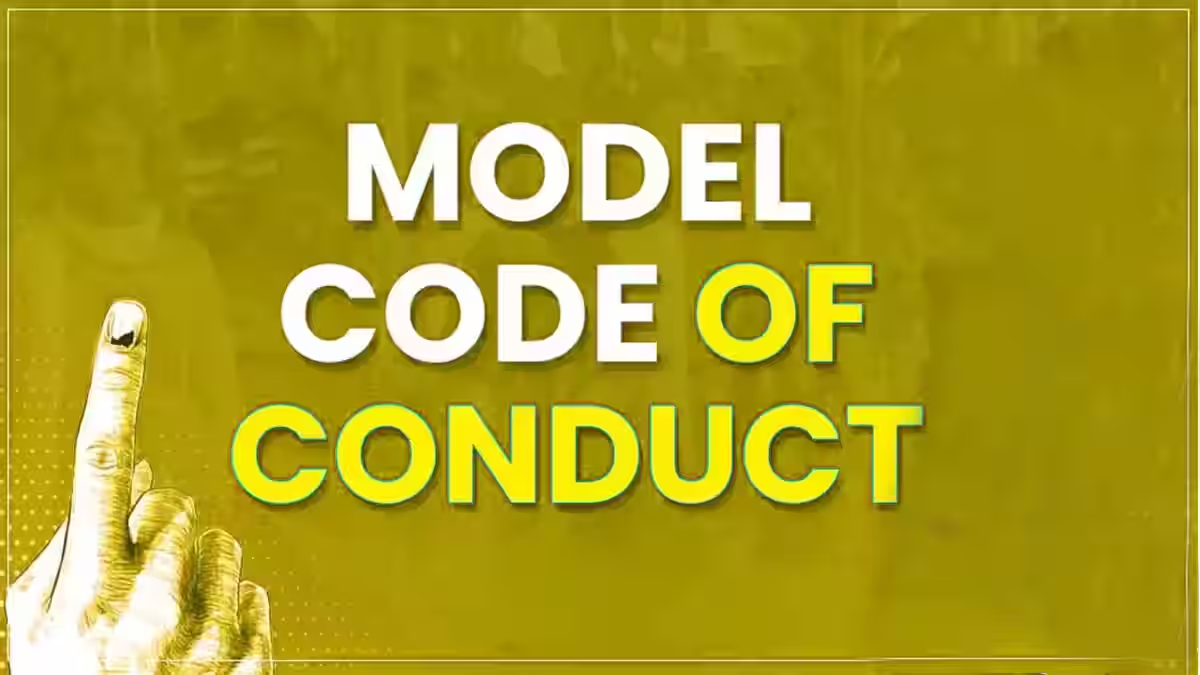Context:
The Election Commission of India (ECI) announced the schedule for the upcoming Lok Sabha elections and with this, the Model Code of Conduct has come into effect.
More on the News
- The ECI announced that the elections to form the 18th Lok Sabha will be held in Seven Phases from 19th April to 1st June and the results will be announced on 4th June.
- Simultaneously, the Assembly polls will also be held in four states— Andhra Pradesh, Arunachal Pradesh, Odisha and Sikkim.
- The results for Arunachal Pradesh and Sikkim will be announced on 2nd June, while the results for Andhra Pradesh and Odisha which will be announced on 4th June.
- With the announcement of the schedule, the Model Code of Conduct came into effect immediately.
About Model Code of Conduct (MCC)
- It is a set of rules issued by the Election Commission of India (ECI).
- Effective from the election schedule announcement until the result declaration, the MCC governs the behaviour of political parties, candidates, and government officials.
- It ensures fair elections by curbing malpractices, maintaining fairness, and creating a balanced electoral environment.
- Although not legally binding, the ECI enforces the MCC through monitoring and penalties for violations.
Background:
- MCC originated in Kerala during the 1960s in response to political violence and malpractices, introduced by Chief Election Commissioner TN Seshan to regulate party and candidate conduct during elections.
- Subsequently, the ECI issued the ‘Minimum Code of Conduct’ in September 1968 during the Mid-Term Elections 1968-69. The code was further revised in 1979, 1982, 1991 and 2013.
- Since 1991, the MCC has been a fundamental aspect of Indian elections, applied uniformly across states, union territories, and various electoral levels, including Lok
- Recognized internationally as a best practice for ensuring electoral integrity, the MCC serves as a model for other democracies, highlighting its significance in upholding fair and transparent elections.
Activities prohibited after implementation of MCC
- Ministers and authorities are prohibited from announcing financial grants or making commitments once elections are announced.
- After Lok Sabha election dates are announced, ministers cannot lay foundation stones or initiate projects except civil servants.
- No projects or schemes favouring the ruling party can be announced post-MCC enforcement, and official machinery cannot be used for campaigning.
- Official visits must not involve electioneering activities, and using official machinery or personnel for campaigning is forbidden.
- Advertisements at the public exchequer’s cost in newspapers and media are prohibited during the election period.
- Bribing, intimidating, or impersonating voters, as well as holding public meetings within the 48-hour “election silence” period before polling closes, are barred to provide a campaign-free environment for voters to reflect on events before voting.
Is the MCC legally binding
- MCC isn’t legally binding under statutory law but holds significant legal and constitutional weight, followed as a matter of electoral ethics and convention.
- Constitutional Basis: Derived from Article 324 of the Indian Constitution, the MCC is supported by various electoral laws like IPC 1860, CrPC 1973, and provisions of the Representation of the People Act, 1951.
- Statutory Support: The EC enforces the MCC through warnings, fines, or recommending disqualification, exercising authority granted by the Constitution.
- Judicial Scrutiny: Judicial scrutiny has upheld the ECI’s authority to enforce the MCC, aligning with its constitutional mandate to ensure free and fair elections.
- Potential Changes: In 2013, the Standing Committee on Personnel, Public Grievances, Law and Justice proposed the idea of legally binding the MCC to address certain shortcomings, indicating ongoing discussions about its effectiveness and enforcement.
Challenges of MCC
- Ineffectiveness in curbing malpractices like hate speech and misuse of money power.
- New technological complexities in monitoring campaigns and regulating digital platforms.
- Lack of legal enforceability, relying on moral persuasion rather than binding laws.
- Limited awareness among voters, candidates, and officials about MCC provisions.
Remedial Measures
- Providing Statutory Backing: Experts suggest integrating the MCC into the Representation of the People Act, 1951, granting it legal authority to enhance its effectiveness and enforcement.
- Public Awareness Campaigns: Efforts should be made to raise awareness among voters, candidates, and officials about the MCC’s provisions.
- Establishment of Fast-Track Courts: Specialized fast-track courts should be established to expedite the resolution of MCC violation cases, ensuring swift justice and deterrence.
- Encouraging the use of platforms like cVIGIL can help in reporting and reducing violations during polls.

